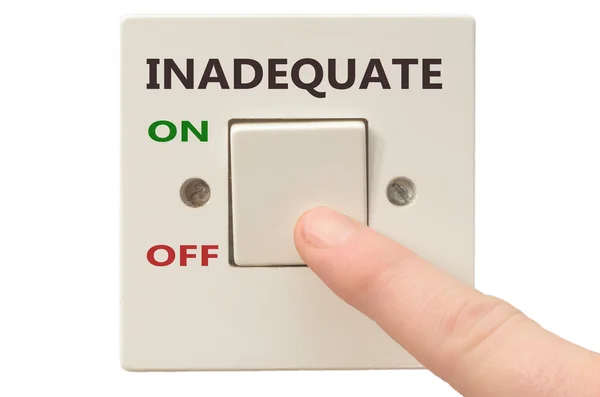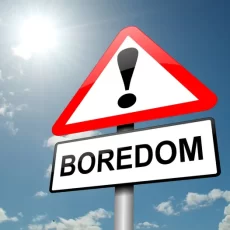If you feel that your life is inadequate, then nothing can enrich your life. You need to change your attitude and embrace happiness and appreciate whatever you have or you have achieved in life. Indeed, it is easier said than done.
You need to understand the difference between emptiness and inadequacy. You may go through emptiness while sitting alone thinking about your past or future whereas inadequacy is like taking stock of your life and say – I have achieved nothing in life. This feeling is more killing. You are forever living in denial. You are so much coloured by this thought that you cannot figure out your achievements. It is not a good state to be in.

“But that inadequacy, or feeling of inadequacy, never really goes away. You just have to trudge ahead in the rain, regardless.”
Think of your family, friends, and well-wishers who always wish good for you. With their support and wishes you have come up in life, achieved so much still, you feel it is not adequate. It is not bad to be ambitious or strive to do something better consistently, but to get bogged down by inadequacy is dangerous. This may lead to many physical and mental health-related issues. You are forever living in “nothingness.”
So how can you overcome this situation?
“Be who you are and say what you feel because those who mind don’t matter and those who matter don’t mind. Do not cry because it’s over. Smile because it happened.” — Dr. Seuss
Why do you feel inadequate?
Feelings of inadequacy arise when we feel we are not enough or not good enough. These feelings generally have nothing to do with our actual performance or abilities. These feelings may have a lot more to do with low self-esteem or low self-confidence than any objective measure of ability or competence.

How to cope with feeling inadequate?
- Take a moment to yourself and journal what you are feeling and thinking.
- Give yourself a pep talk.
- Practice meditation.
- Comfort yourself as you would want a parent or friend to do.
- Find a positive distraction.
Comparisons with siblings or peers do not do you any favours when it comes to feeling inadequate.
As Teddy Roosevelt said: Comparison is the thief of joy.
Moreover, a habit of self-criticism often fuels a sense of inadequacy. And of course, early life experiences and trauma can lead to a feeling of inadequacy later in life. Sometimes you feel inadequate because you are thinking that way: You do not know how to handle feeling bad. And one of the most common sources of genuine inadequacy is that you do not allow yourself to practice managing difficult feelings on your own. This implies that you never get to build emotional confidence.
Maybe you wake up every day feeling inadequate and like you should be further along in your life.
These feelings of inadequacy can happen at any age and stage of life and are often caused by:
- Low self-esteem
- Dejection
- Fear of rejection
Why?
I thought I had turned 60 and had accomplished nothing in my life. Seriously! This happens with all of us whether we are 16 or 60. Understand, achievements are relative, for you it may be nothing, for others it may be dream life. Who is the judge here? Like we say it is not right to judge others, it is also not right to judge yourself. You should explore every opportunity, coming your way and give your best shot. This is in your hands.
It has been noticed that even the most accomplished people can fall into this trap of feeling like a failure. Though they may not sit in a corner and cry about it like lesser mortals.
“Believe in yourself! Have faith in your abilities! Without humble but reasonable confidence in your own powers, you cannot be successful or happy.”
However, the feeling is common.
Goals, and the desire to accomplish great things in life, are not bad things on their own.
Mostly, that is a positive thing.
Our world would not be where it is today if we did not have people who achieved great things. However, if we become consumed by feelings of failure and not accomplishing enough regularly, this can lead to unhealthy thoughts.
Through experience and an attitude change, I have been able to keep those negative feelings at bay.

It does not mean every day we wake up feeling like a sensational success, but we can move forward with our lives and goals in a healthy manner.
There is a need to overcome this feeling on a priority basis, for this, you need to prepare a list of things you have accomplished:
As a first measure, start chronicling your accomplishments as we often tend to forget our successes and probably have done more than we realize. A visual reminder of these accomplishments can do wonders for one’s confidence.
You can start writing down the small accomplishments, not necessarily in finer detail. But you should include things you might take for granted, like graduating from high school or owning a car. Write it on a piece of paper and post it on your wall.
When you see all the things you have done, you will not ever say, “I have accomplished nothing.”
Finally, spot some cheerleaders in life, maybe a family member or friend, or colleague who has trust in your abilities and is proud of your accomplishments.

“Confront your inadequacies and push your personal boundaries: It’s the surest way to grow, improve and expand the scope of your influence.”
He is the one who says: Hey Cheer Up and HappyHO!





